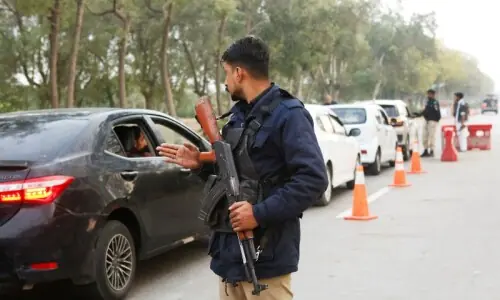ISLAMABAD: More than 70pc increase in complaints was reported at the cyber harassment helpline of Digital Rights Foundation (DRF) during 2020, showing a high number of cases related to online blackmailing, extortion and hacking during the lockdown.
The DRF Cyber Harassment Helpline Report 2020, launched on Wednesday states that 3,298 cases of online harassment were registered at the helpline. Around 66pc of the complaints were lodged by women while 34pc of the complaints were registered by men; 1pc of the complaints were from members of the trans community and religious minorities.
According to the report, men do not talk about psychological issues with their family or peers due to internalised roles of masculinity that contradict the concept of asking for help or support when dealing with emotions.
“Thus, men are more likely to reach out for help outside their support circles,” the report states, adding helpline support staff was specifically trained to offer psychological support to callers.
As many as 21 complainants from marginalised groups experienced vulnerability online and some of these callers were specifically targeted by individuals for personal reasons, while others were victims of harassment both online and offline simply because of prejudice against their gender or sexuality, some of them also common targets of hate crimes.
“Members of marginalised communities find it difficult to report such issues to law enforcement agencies as these institutions lack sensitisation,” the report points out.
Around 57pc of the complaints were lodged from Punjab followed by 11pc from Sindh, 4pc from Khyber Pakhtunkhwa, 2pc from Balochistan, 1pc from Kashmir and 4pc from Islamabad.
DRF executive director Nighat Dad said 2020 proved to be one of the most challenging and demanding years for the helpline, not only because of the lockdown but because of a surge in cases of online violence and harassment.
“However, we found new and innovative ways to keep working, especially when we realised that as lockdowns grew, so did cyber harassment,” she added.
Those who lodged complaints are brave for speaking up and their efforts will hopefully contribute towards breaking the cycle of online harassment in Pakistan, the report stated, adding 33pc of the cases were related to blackmailing and extortion, which often entails the use of an individual’s personal information, photos or psychological manipulation to make threats and demands.
This number was followed by 23pc cases related to hacking of social media and WhatsApp accounts along with financial fraud. The DRF has been operating this helpline since the last four years providing its callers with legal aid, digital safety assistance and mental health counselling.
Published in Dawn, February 18th, 2021

































